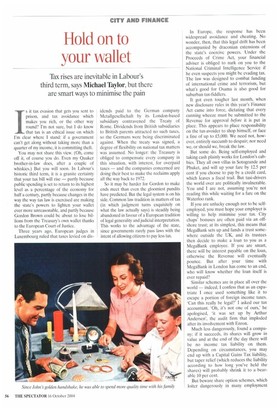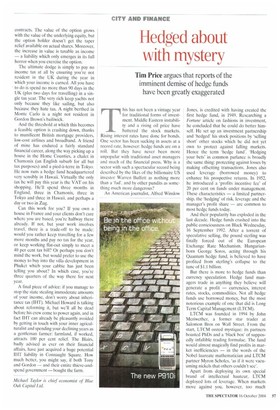Hold on to your wallet
Tax rises are inevitable in Labour's third term, says Michael Taylor, but there are smart ways to minimise the pain Is it tax evasion that gets you sent to prison, and tax avoidance which makes you rich, or the other way round? I'm not sure, but I do know that tax is an ethical issue on which I'm clear where I stand: if a government can't get along without taking more than a quarter of my income, it is committing theft.
You may not share this view. (Oh, come off it, of course you do. Even my Quaker brother-in-law does, after a couple of whiskies.) But you will soon. In Labour's historic third term, it is a granite certainty that your tax bill will rise — partly because public spending is set to return to its highest level as a percentage of the economy for half a century, partly because changes in the way the way tax law is exercised are making the state's powers to lighten your wallet ever more unreasonable, and partly because Gordon Brown could be about to lose billions from the Treasury's own wallet thanks to the European Court of Justice.
Three years ago, European judges in Luxembourg ruled that taxes levied on div idends paid to the German company Metal lgesellschaft by its London-based subsidiary contravened the Treaty of Rome. Dividends from British subsidiaries to British parents attracted no such taxes, so the Germans were being discriminated against. When the treaty was signed, a degree of flexibility on national tax matters was assumed. No longer: the Treasury is obliged to compensate every company in this situation, with interest, for overpaid taxes — and the companies concerned are doing their best to make the reclaims apply all the way back to 1972.
So it may be harder for Gordon to make ends meet than even the gloomiest pundits have predicted. But the legal system is on his side. Common law tradition in matters of tax (in which judgment turns exquisitely on what the law actually says) is steadily being abandoned in favour of a European tradition of legal generality and judicial interpretation. This works to the advantage of the state, since governments rarely pass laws with the intent of allowing citi7ens to pay less tax. In Europe, the response has been widespread avoidance and cheating. No wonder, then, that this legal drift has been accompanied by draconian extensions of the state's coercive powers. Under the Proceeds of Crime Act, your financial adviser is obliged to nark on you to the National Criminal Intelligence Service if he even suspects you might be evading tax. The law was designed to combat funding of international crime and terrorism, but what's good for Osama is also good for suburban tax-fiddlers.
It got even tougher last month, when new disclosure rules in this year's Finance Act came into force, dictating that every cunning wheeze must be submitted to the Revenue for approval before it is put in place. This appears to place responsibility on the tax-avoider to shop himself, or face a fine of up to £5,000. We need not, however, entirely succumb to despair; nor need we, or should we, break the law.
But some do. Being self-employed and taking cash plainly works for London's cabbies. They all own villas in Sotogrande and Phuket, and will up your fare by 12.5 per cent if you choose to pay by a credit card, which leaves a fiscal trail. But taxi-drivers the world over are politically invulnerable. You and I are not, assuming you're not reading this while waiting for a fare on the Waterloo rank.
If you are unlucky enough not to be selfemployed, you must hope your employer is willing to help minimise your tax. City chaps' bonuses are often paid via an offshore trust; at its simplest, this means that MegaBank sets up and funds a trust somewhere outside the UK, and its trustees then decide to make a loan to you as a MegaBank employee. If you are smart, there will be interest payable on the loan, otherwise the Revenue will eventually pounce. But after your time with MegaBank in London has come to an end, who will know whether the loan itself is ever repaid?
Similar schemes are in place all over the world — indeed, 1 confess that as an expatriate I once used something like it to escape a portion of foreign income taxes. 'Can this really be legal?' I asked our tax accountant. 'Oh, it's not one of ours,' he apologised, 'it was set up by Arthur Andersen', the audit firm that imploded after its involvement with Enron.
Much less dangerously, found a company; if it succeeds, its shares will grow in value and at the end of the day there will be no income tax liability on them. Depending on circumstances, you may end up with a Capital Gains Tax liability, but taper relief (which reduces the liability according to how long you've held the shares) will probably shrink it to a bearable 10 per cent.
But beware share option schemes, which loiter dangerously in many employment contracts. The value of the option grows with the value of the underlying equity, but the option holder doesn't get the taper relief available on actual shares. Moreover, the increase in value is taxable as income — a liability which only emerges in its full horror when you exercise the option.
The ultimate dodge is simply to pay no income tax at all by ensuring you're not resident in the UK during the year in which your income is earned. All you have to do is spend no more than 90 days in the UK (plus two days for travelling) in a single tax year. The very rich keep yachts not only because they like sailing, but also because they hate tax. A night berthed in Monte Carlo is a night not resident in Gordon Brown's bailiwick.
And the threshold at which this becomes a feasible option is crashing down, thanks to munificent British mortgage providers, low-cost airlines and broadband. A friend of mine has endured a fairly standard financial career, along the way picking up a house in the Home Counties, a chalet in Chamonix (an English suburb for all but tax purposes) and a pied-a-terre in Tokyo. He now runs a hedge fund headquartered very sensibly in Hawaii. Virtually the only tax he will pay this year is the VAT on his shopping. He'll spend three months in England, three in Chamonix, three in Tokyo and three in Hawaii, and perhaps a day or two in Zug.
Can this work for you? If you own a house in France and your clients don't care where you are based, you're halfway there already. If not, but your work involves travel, there is a trade-off to be made: would you rather keep travelling for a few more months and pay no tax for the year, or keep working flat-out simply to meet a 40 per cent tax hill? Or perhaps you don't mind the work, but would prefer to use the money to buy into the villa development in Phuket which your cabbie has just been telling you about? In which case, you're three quarters of the way there for next year.
A final piece of advice: if you manage to stop the state stealing immoderate amounts of your income, don't worry about inheritance tax (INT). Michael Howard is talking about reforming it, but we'll all be dead before his crew come to power again, and in fact IHT can already be pleasantly avoided by getting in touch with your inner agriculturalist and spending your declining years as a gentleman farmer: farmland, if worked, attracts 100 per cent relief. The Blairs, badly advised as ever on their financial affairs, have just acquired a huge potential MT liability in Connaught Square. How much better, you might say, if both Tony and Gordon — and their entire thieve-andspend government — bought the farm.











































































































 Previous page
Previous page